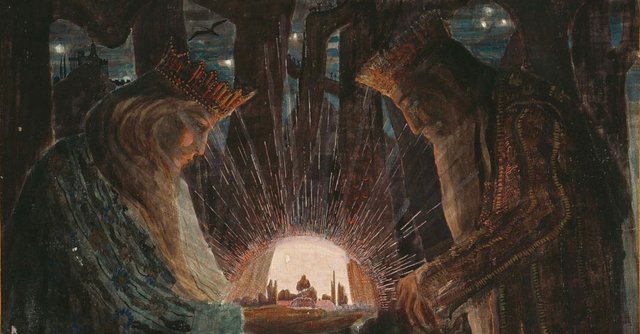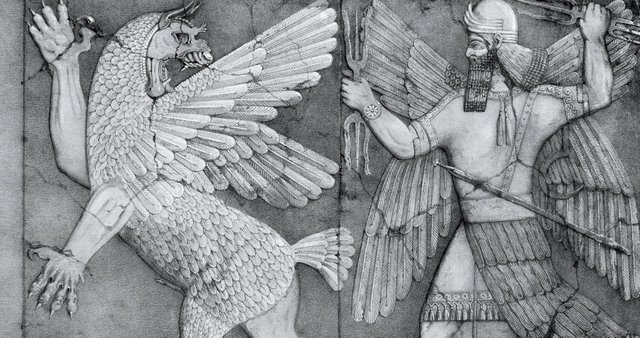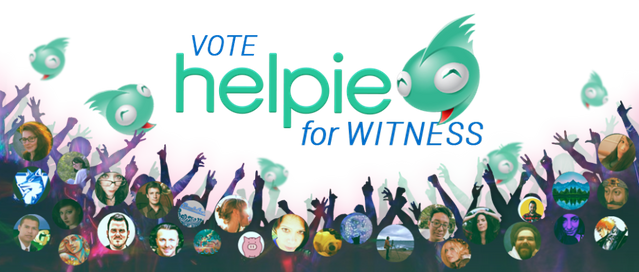Bound By Myth
We are the stories we tell each other. Every society, every culture and every era has their own overarching, binding myths. These myths are necessary; without them we would not be a society, but still be divided into small tribes with a maximum size of approximately 500 individuals.

Kings' Fairy Tale, 1909 - source: Wikipedia
Tribes don't grow past a certain number for one simple reason; we're just not physically or mentally capable of maintaining some semblance of social control or coherence when the number of people grows too big. This is why the only successful socialist experiments have been done in small communities, like the Kibbutz. When we all know each other and take responsibility for each others kids, old fashioned social control methods like naming and shaming work like a charm. No laws needed. No money needed. No economy needed even, and everyone gets what they do need; shelter, food and a loving community.
If humanity were a car, it would have stood still in neutral for a couple of millions of years, not making any impact on the environment and happily traveling around somewhere in the middle of the food-chain. We hit first gear somewhere between 100 and 70 thousand years ago when, according to conventional science, some small genetic mutation we quite rapidly became smart; 100,000 years ago we made structures from sandstone, the earliest signs of personal adornment were found in the form of perforated seashells dating around 82,000 years ago and 70,000 years ago we left evidence of abstract thinking in the form of symbolic art, somewhere in a South African cave.
All this time we were organized in tribes. Our ability to communicate and to organize lifted us up to the top of the food chain in the evolutionary blink of an eye, but we were still strictly egalitarian tribes. But then, around 10,000 years ago we hit second gear with the first agricultural revolution; we already knew how to communicate and how to organize, so it was just a matter of scale to adjust to the exponentially larger amounts of food and the resulting higher birthrate and larger population. We also stopped being nomads and settled down in cities and city-states. But was it really just a matter of scale? No of course not. It couldn't be because we were now much larger than the traditional tribe, and most people we met were strangers to us, strangers to whom we didn't owe any loyalty.
And that's where the myths began. The oldest myth we have found is the one about Gilgamesh, the historical king of the Sumerian city-state of Uruk. Any society larger than a tribe needs a common story to tell their kids and each other. In tribal societies there's not really such a thing as "culture." Culture is given shape in the myths that define the culture. I reckon that in the very beginning it was the farmer with the largest farm, but throughout our written and oral history the myths that define our culture have always been a top-down narrative. In our religious myths, the God figure is the one that provides us with our daily bread, listens to us like a good, but strict father figure, punishes us when we've done something bad and so on. In the fairy tales we tell our children, the King is usually depicted as a basically good person, who's daughter is the grand prize for any aspiring young noble man, and who does only bad things when he's duped by some evil vizier who wants to marry the beautiful princess. No matter what myth or what era, the myth has always been a justification for the current power structure.
The binding power of these myths are the necessary part of them. When a kid growing up gets told the same stories over and over again, and hears these same stories from adults who differ in opinion greatly on other subjects, it's very difficult to not believe in the fundamental truth behind these stories. And this is a good thing when we think about growing our community beyond the tribe; it's these common and universal myths that bind larger groups together like glue. From there on out we make laws, further sustaining society's top-down layered organisation, based on the stories we tell each other. For us, here in "the west", the Old and New Testaments of The Bible have been the overarching story for ages now, supplemented by the fairy tales I mentioned earlier. Throw in some symbols, like a family weapon shield, coat of arms or, even better, a flag, some local foods and drinks, a language and voila, there's the beginning of a culture.
Around 500 years ago humanity's car switched to third gear with the scientific revolution during and after the Renaissance. It's been slow going, but The Bible is losing ground in the sense that more and more people are favoring the scientific explanation of the world over the Biblical one. Besides, we also had the French Revolution and the advent of liberal democracies, so the classical fairy tales supporting the King's position as God's representative on Earth, are losing relevance too. But we've got another myth; it's capitalism of course.

source: Wikipedia
Myth no. 1: all our problems on national (and increasingly international) level can be solved with economic growth. Well, they're not called "myths" without reason, as this deeply irrational belief demonstrates. In our minds we've equated all kinds of progress with economical growth. When we say that we now live more comfortable lifes than a century ago, we almost automatically associate that with the economy; we say it's because of economical growth instead of technological progression. We then say: yeah, but technological progression is sped up greatly by economical incentives... What a weird thing to believe. The opposite is at least as true: technological advancements are only delayed by economical laws that have no bearing on reality. I've said it so often: there are no reasons at all for us to not have started colonizing Mars a decade ago, except for economical reasons. The economy dictates that the iPhone 12 has probably already been developed, but all the 10's and 11's need to be sold first, before 12 can be released. We launched a self-driving mars rover thing decades before self-parking cars became widely available. Again, there's no real reasons for these delays, it's not that we don't have the material, the man- and brainpower, for Mars we have eagerly waiting thousands of volunteers who are willing to go that one-way trip... Only money, only the economy holds us back. Any practical reasons for hunger to exist we eliminated 10,000 years ago, it's just the myths, capitalism being the most recent, that keep hunger alive...
Myth no. 2: all our problems on an individual level can be solved by purchasing something. That's why we love the mall, or it's 21st century incarnation, Amazon dot com. Everything's for sale. Or at least, it will be so as long as we individually contribute to economic growth. Aren't we blessed then, with a myth that says we can just go for personal economic growth, just maximize our own material wealth, because that's equal to contributing to the economy as a whole? It's perfect! Well, let me remind you of an old and wise saying: if it sounds too good to be true, it's probably not true. If we say that we want to stop polluting the environment, or even that we want to stop anthropogenic climate change, how on earth will we manage that without shrinking the economy? We can feed 12 billion people every year, that's how much we overproduce already; more growth answers nothing and can only make more trouble. What we need to do is redistribute more, at least as long as we believe this latest myth to be the "best we humans can do." Even if you believe that any solution to any problem that has the words "economic growth" in them, should make you suspicious, if not make you laugh out loud and walk away.
Businesses, in the capitalist myth, are the generators of growth and provide jobs for everyone willing and able to work for a living. What the myth doesn't tell is that these same businesses hate capitalism; all businesses that take their growth serious aim, not to compete with, but to usurp the competition. Capitalism can end in one way only, and we're seeing it happen around us. "Competition" never lasts as there's always just one or just a few left standing in the market arena. These few then manipulate the government to protect them. Many believers say that's the problem; capitalism is interfered with too much, if we would only leave the markets alone and let competition do it's work to benefit the consumers.... Forgetting that politicians are bought by businesses, not the other way around. This plutocracy is not accidentally often called "socialism for the rich," as these winners know very well how to band together and protect their social class, regardless of ideological-, political- or national alignments. Competition is meaningless when not competing to eventually win and not have to compete anymore. The short video at the end of this post is a quick summary of all the reasons why capitalism is so great; the speaker contradicts himself though as he readily admits that businesses don't like to compete and ultimately play to win, but still goes on to tell about the benefits of competition.
Don't see this as an endorsement for communism, I know it's easy to translate criticisms of capitalism as such, but please don't; every -ism is just another story that's bound to be used by those in power, as all other stories have ever been used. And besides that, they all take just one central aspect of human nature and build an entire world-view around that one thing. In capitalism the individual is the beginning and end of everything, in communism the community plays that same role and both end up describing human beings as total caricatures of what they truly can be; a greedy, cold and calculating homo economicus in capitalism, and a free-riding good-for-nothing homo commensuratum in communism. They're both myths that serve only the ones serving up the story-line. The reason why I don't criticize communism should be evident: if we were bound by a communist myth, things might have been different. We need new myths that bind us around our common humanity. Myths that say it's okay to have leaders and followers, as long as they don't devolve into rulers and subjugates. Myths that drown us in our interdependence, without making us feel ashamed or less because of it. Myths that acknowledge that personal freedom can only take shape in a welcoming community that takes care of all individuals' basic needs, so they can be free to hone their personal interests and hone their individual talents. Myths that speak of our uniqueness, without making us feel special, embracing our differences while acknowledging that we're also the same and in the same boat.
Is that too much to ask? For now, hell yeah! But myths are not like genes that take thousands or millions of years to change; cultural evolution is much faster because stories can be changed relatively quickly. So who knows, we can always hope :-) Until then, here's the reminder of capitalism's great attributes. These are the myths he believes are told about capitalism, and he can't help but throw in the need for more growth, so we can all have a piece of a bigger pie:
Top Three Common Myths of Capitalism | Learn Liberty
Thanks so much for visiting my blog and reading my posts dear reader, I appreciate that a lot :-) If you like my content, please consider leaving a comment, upvote or resteem. I'll be back here tomorrow and sincerely hope you'll join me. Until then, keep steeming!

Recent articles you might be interested in:
| Latest article >>>>>>>>>>> | Becoming Evil |
|---|---|
| Wisdom In Humor | The Big Picture |
| Man Exploiting Man | SJW Cringe |
| Flat Out Wrong | It's Not Mine! |

Thanks for stopping by and reading. If you really liked this content, if you disagree (or if you do agree), please leave a comment. Of course, upvotes, follows, resteems are all greatly appreciated, but nothing brings me and you more growth than sharing our ideas. It's what Steemit is made for!


Just for Full Disclosure, I'm invested in these crypto-currencies:
Bitcoin | Litecoin | EOS | OmiseGo | FunFair | KIN | Pillar | DENT | Polymath | XDCE | 0x | Decred | Ethereum | Carmel | XYO

@helpie is a WITNESS now! So please help @helpie help you by voting for us here!

Curated for #informationwar (by @wakeupnd)
Ways you can help the @informationwar!